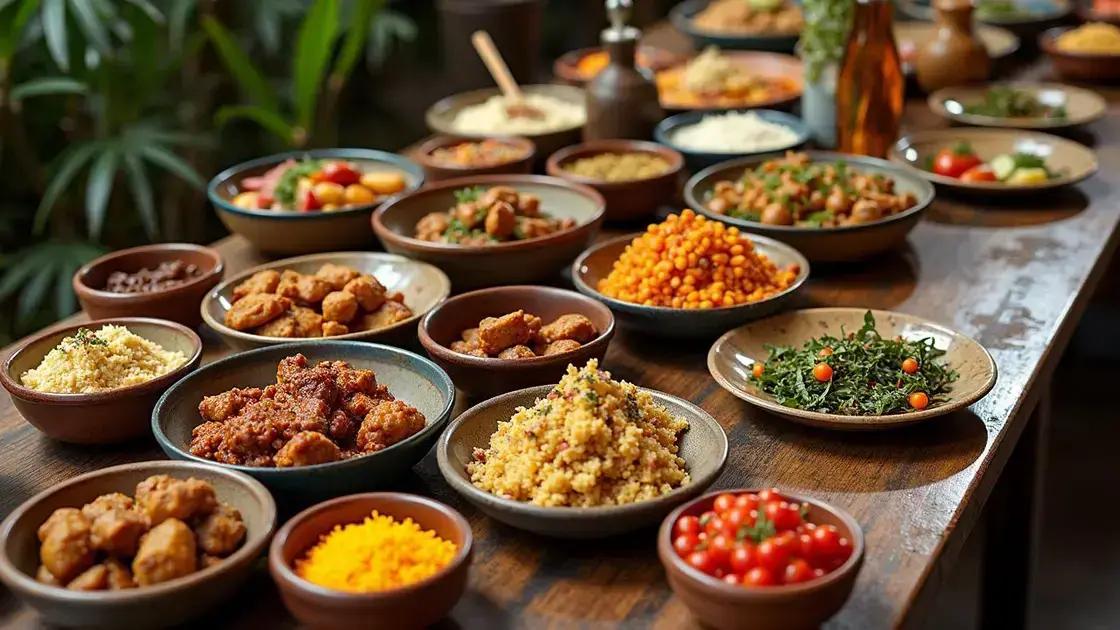Is the African recipe safe? Yes, with proper food safety practices like using fresh ingredients, avoiding cross-contamination, cooking food thoroughly, and following authentic recipes, you can enjoy African cuisine safely and deliciously.
Curious about culinary practices? The question on many minds is, “Is the African recipe safe?” African cuisine is a vibrant mix of flavors and traditions, but like any food culture, it’s essential to consider safety. In this article, we will dive deep into understanding African recipes, assessing food safety while cooking, and offering tips to enjoy these delicious dishes without worry. Let’s explore these exciting aspects of African cooking together!
Understanding African Recipes

Understanding African recipes involves diving into a rich cultural and culinary tradition. African cuisine varies from region to region, showcasing a blend of indigenous ingredients and cooking techniques that reflect the continent’s diverse cultures.
Key Ingredients in African Recipes
Many African recipes highlight staples such as grains, legumes, and vegetables. Popular ingredients include maize, yam, rice, and an array of beans. Spices and herbs play a crucial role in adding flavor and character to dishes, with ingredients like ginger, coriander, and paprika topping the list.
Cooking Techniques Unique to Africa
Each region offers distinct cooking methods. For example, in West Africa, stews are common and often served with rice or fufu. Grill and smoke are popular in Southern Africa, where meat dishes are staple fare. Traditional outdoor cooking methods, such as using a fire pit or clay ovens, add a unique flavor to the dishes.
The Importance of Community and Sharing
Sharing food is a significant aspect of African culture. Meals are often communal, bringing family and friends together to enjoy the dishes. Recipes are frequently passed down through generations, keeping the cultural heritage alive while adapting to modern tastes and available ingredients.
Recognizing the diversity and community behind African recipes helps us appreciate their safety. Understanding the ingredients and preparation methods can also guide us in making safe culinary choices.
Assessing Food Safety in African Cooking

When it comes to cooking, especially in African cuisine, food safety is crucial. This ensures that the dishes we enjoy are not only delicious but also safe to eat. Let’s look at some key aspects of assessing food safety in African cooking.
Understanding Common Food Risks
Like all cuisines, African cooking can present certain food safety risks. Contaminated ingredients can lead to foodborne illnesses. Common issues include improper handling of raw meats, undercooked grains, and unwashed vegetables. Being aware of these risks is the first step toward safe cooking.
Safe Food Preparation Practices
Practicing safe food preparation is essential. Always start with clean hands and surfaces. Make sure to wash fruits and vegetables thoroughly. Use separate cutting boards for meats and vegetables to avoid cross-contamination. Cooking foods to the right temperature will also kill harmful bacteria.
Storage Tips for Leftovers
Properly storing leftovers is important in maintaining food safety. Foods should be cooled quickly and stored in clean, airtight containers. Labeling with the date helps keep track of freshness. Generally, leftovers should be consumed within three to four days to ensure safety.
By assessing these food safety measures, you can enjoy the rich flavors of African recipes while keeping health at the forefront.
Tips for Enjoying African Cuisine Safely

Enjoying African cuisine can be a delightful experience filled with rich flavors and cultural heritage. However, it is important to do so safely. Here are some tips to help you indulge in African dishes without worry.
Choose Authentic Sources
When trying African recipes, make sure to get them from trustworthy and authentic sources. Books, reputable websites, or experienced cooks will guide you in preparing safe and traditional meals.
Be Aware of Ingredient Freshness
Always pay attention to the freshness of ingredients. Using fresh produce, meats, and spices ensures not only better flavor but also safety. Check expiration dates and inspect for any signs of spoilage.
Incorporate Safe Cooking Methods
Food safety is enhanced by using proper cooking methods. Cooking food thoroughly, especially meats and seafood, reduces the risk of foodborne illnesses. Use a food thermometer to check that meats reach safe internal temperatures.
Enjoy in Moderation
While it’s tempting to indulge in large servings of delicious African dishes, moderation is key. This not only promotes better health but also allows you to savor the unique flavors without overwhelming your system.
By following these tips, you can enjoy the vibrant and diverse offerings of African cuisine while keeping health and safety in mind.
In Summary: Enjoying African Cuisine Safely
Exploring African cuisine offers a rich tapestry of flavors, traditions, and experiences. By understanding the unique ingredients and cooking methods involved, you can fully appreciate the culinary art of African recipes.
Assessing food safety in African cooking is essential; it involves being aware of common food risks and practicing safe preparation techniques. Following the tips provided will help you enjoy these delicious dishes safely while respecting their cultural significance.
By combining knowledge of food safety with the joy of cooking and sharing meals, you can savor the best of African cuisine while ensuring a delightful and safe dining experience.
FAQ – Frequently Asked Questions About African Cuisine Safety
Is it safe to try African recipes at home?
Yes, African recipes can be safe to try at home as long as you follow proper food safety practices such as using fresh ingredients and cooking food thoroughly.
What are the common risks in African cooking?
Common risks include using contaminated ingredients, improper handling of raw meats, and not cooking dishes to the right temperatures.
How can I ensure my meals are safe when cooking African dishes?
You can ensure safety by practicing good hygiene, washing all ingredients, avoiding cross-contamination, and cooking food to appropriate temperatures.
What should I know about ingredient freshness?
Always check the freshness of your ingredients and avoid using anything that looks spoiled. Fresh produce, meats, and spices enhance safety and flavor.
Are there special storage tips for leftovers?
Yes, store leftovers in clean, airtight containers and consume them within three to four days. Always cool leftovers quickly before storing.
How important is it to follow authentic recipes?
Following authentic recipes is important as they ensure that you use the correct ingredients and techniques, enhancing both flavor and safety.













